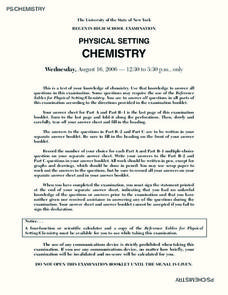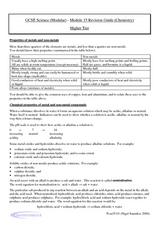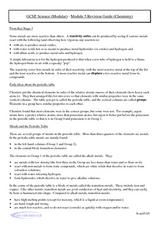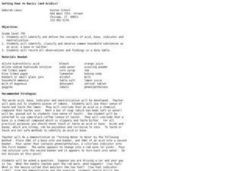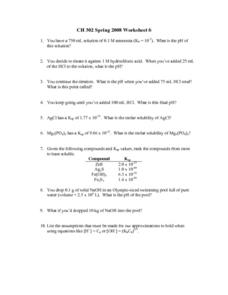Curated OER
2002 U.S. National Chemistry Olympiad National Exam - Part I
As to be expected from the American Chemical Society Olympiad Examinations Task Force, this 60-question test tops the charts in terms of excellence. It consists entirely of multiple choice questions designed to assess a year's worth of...
Curated OER
Chapter 15 Review, Section 2: Acid-Base Titration and pH
Keep it simple with this chemistry assignment. Learners examine an acid-base titration graph and answer four questions about the data. Then they will balance neutralization equations and calculate molarity for several specific solutions....
Curated OER
Acids, Bases, and Indicators
Chemistry or physical science fledglings get comfortable identifying acids and bases with a variety of pH indicators. They discover that different indicator solutions have different ranges, practice testing soil acidity, and use antacids...
Curated OER
Regents High School Examination PHYSICAL SETTING CHEMISTRY 2006
The 2006 version of the Regents High School Exam is just as thorough as the rest of them! Assess chemistry learners on an entire year's curriculum when they take this thirteen page test.
Curated OER
Revision Guide - Chemistry
Don't you wish you had the time to type up a study guide for your chemistry class? With this resource, there is no need! A chart comparing the properties of metals and non-metals tops the handout, followed by notes on the reactivity...
Curated OER
Chapter 14 Review, Section 3: Acids and Bases
Aside from a mention of a textbook page, this chemistry assignment is a suitable review of acids and bases. It begins by addressing conjugate pairs and acid base reactions. Neutralization and amphoteric properties are also dealt with....
Curated OER
Module 5 Revision Guide - Chemistry
If you use this as an outline for your chemistry lecture on metals, your young chemists will absorb a well-rounded overview. This is not a worksheet per se, but a useful summary of the behavior of metals. Save yourself some planning and...
Curated OER
Fatty Acids For Soap Making
High schoolers titrate a sample of fatty acids with standardized sodium hydroxide solution. From the amount of base needed for neutralization and the mass of sample used for titration, the apparent average molar mass of the sample is...
Curated OER
Computer Titration Lab Simulation
Students perform a lab simulation for a titration of monoprotic and diprotic acids. In this titration simulation lesson plan, students use a computer program to neutralize an acid with a base and compute the unknown concentration of the...
Curated OER
Acids and Alkalis
This PowerPoint progresses slide-by-slide through all the facts you would want to deliver about acids, alkalis, salts, and the related lab tests. Each slide has one or two facts about a physical or chemical property or behavior. The...
Curated OER
Unit 7 Acid and Base
A series of 25 multiple choice questions is presented to chemistry learners to review properties of acids and bases. A page of notes precedes the questions and contains information about the Arrhenius and Bronsted-Lowry definitions,...
Curated OER
Acids and Bases, strong and weak pH
Lists of facts to consider and equations to use when working with Acids and Bases are very well detailed in this presentation. Students can make notes while viewing to review acids and bases. Many of these facts will stimulate further...
Curated OER
Chemical Reactions
In this chemical reactions worksheet, students solve 16 exercises by writing and balancing chemical reactions. They calculate the concentration of various solutions.
Curated OER
Science Lessons for Grade 7
Seventh graders construct a food chain based on pictures shown on the board. In this biology lesson, 7th graders describe the motion of particles as energy is changed. They explain how pH changes during neutralization.
Curated OER
Acids and Bases
In this acids and bases worksheet, students write equations for dissociation reactions, they complete neutralization reactions and they identify strong acids and strong bases.
Curated OER
Getting Down to Basics (and Acidics)
Seventh graders investigate acids and bases. In this acids and bases instructional activity, 7th graders use household items such as coffee, lemons and soap to define acids and bases. They observe a demonstration to show how indicators...
Curated OER
Milk Glue
Students observe a precipitation and neutralization reaction and learn to filter the products of the precipitation reaction. In this precipitation and neutralization lesson plan, students create curds and whey using milk and vinegar....
Curated OER
Neutralization Reactions
In this neutralization reaction worksheet, students read about how neutralization reactions are double replacement reactions in water. They complete five questions about neutralization reactions including completing five reactions and...
Curated OER
Titration
In this titration worksheet, students read about titrations or neutralization reactions used to determine the concentration of acids or bases. They are given sample problems used to find the concentrations of acids or bases. Students...
Curated OER
WS 10.8 Acid-Base Neutralization and Titration
In this acid and base activity, students write balanced equations for neutralization reactions, they calculate volumes of acids and bases needed to titrate solutions and they determine molarities of solutions.
Curated OER
Acids and Bases Spring Worksheet
In this acids and bases worksheet, students answer 20 questions about acids, bases, neutralization reactions, buffers and molar solutions.
Curated OER
Acids and Bases: Their Reactions, Conductivity, Base Indicators and Neutralization Reaction
Students conduct experiments and collect data to determine physical and chemical characteristics of acids and bases.
Curated OER
Colorful Milk of Magnesia
Students explore acids, bases, and indicators. They observe the various colors of an acid-base indicator solution and the neutralization of an acidic solution by an antacid.
Curated OER
Introduction to Neutraliization
Students explore acids and bases and the process of neutralization.T hey practice volume measurements and observe the neutralization of an acid
directly through bubble formation and indirectly through indicator color changes.





